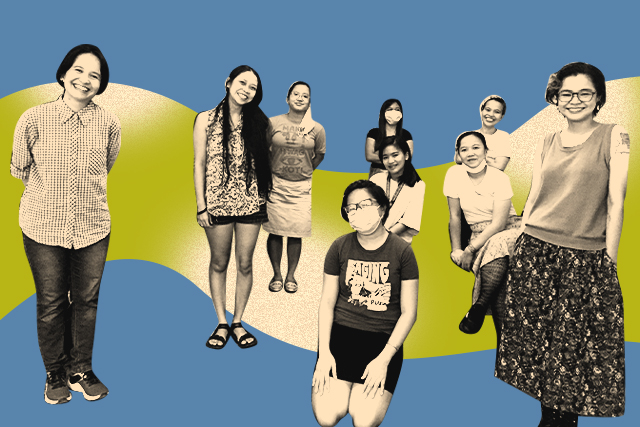An aftermath of the political blunders under six-month lockdown is how a lot of Filipinos have begun actively seeking the guiding voice of progressive collectives, either to get more political or simply revel in a brand of comfort that hinges on solidarity rather than detox and detachment.
One such group is Gantala Press, an independent feminist literary collective based in Metro Manila. We got to chat with its team on the subversion of independent publishing, the power of collaboration and the how-to’s of setting up feminist groups in your chosen industry.
Hi, Gantala Press! How is the team doing these days? I saw on the organization’s Instagram that you recently acquired a couple of books for your collection. Did you guys close up shop at one point during quarantine?
Hello! We’re okay, but we’re agitated, angry and anxious about what is happening to our country. Most of us have day jobs and, like the rest of Metro Manila and the Cavite-Laguna areas, are working from home. We get by with a little help from one another, sharing useful links and posts on social media, holding educational discussions on topics such as feminist theories and kamustahan sessions on the weekends.
We were set to launch a feminist space/library/shop last March but the pandemic happened so we had to suspend all plans related to it. We also had to hold off accepting online orders of our books and shirts as a health and safety measure. But we have been producing regularly, writing statements on issues, curating mini-exhibits on Instagram and even publishing two digital zines during the pandemic.
We’re glad that Gantala Press is still standing strong. Can you introduce the organization to our readers and share with us the type of work that you do as a Filipina feminist press?
Since Gantala Press’ formation in 2015, we have produced books, anthologies, comics, cookbooks and zines that center on women’s issues and narratives. We collaborate with women’s groups and art collectives in organizing events and discussions on women, independent publishing and worker/food/agrarian issues.
Gantala Press began in response to the underrepresentation of women in literary institutions such as workshops, seminars, anthologies, etc. Through the years, we’ve redirected our work towards documenting, through literature and publishing, women’s issues and exposing their struggles. More and more we’ve committed to use what resources we have in publishing the writings of women from the basic sectors—peasant women, workers, the urban poor; and amplifying the collective voice of women.
I read that you donate part of your earnings to projects that support victims of state violence and that all your sales go to publishing projects for long-silenced communities. Can you tell us more about this?
Yes, we’ve contributed sales of our works to various causes almost since our first book. We’ve contributed to fundraising projects for internally displaced persons (IDPs) of the Marawi Siege in 2017; relief operations for peasant families and their children; bailing out wrongfully arrested activists, among others.
We’ve donated our books to women’s libraries and Lumad schools. These are simple ways of giving back to the communities who are ultimately the source of these books. The books we publish are their stories; it’s wrong for us to profit from them. Our flexibility as a non-profit small press allows us to publish the stories of communities, often written by the communities themselves; stories that mainstream publishing or mainstream media would not be interested in or would take a longer time to publish.
In a talk delivered by Faye Cura on small press activism in the Philippines, she mentioned that when she was trying to set up Gantala, there were people who asked why it wouldn’t publish feminist works by men. Can you share with us the reason behind this decision?
We feel that men take up most of the space that is available in any given field, especially literature and the visual arts. As a simple example, there is only one woman writer and zero woman visual artists among the National Artists of the Philippines (a cultural institution that has to be questioned and critiqued as well, by the way). Even now, panels in writing seminars or webinars can still be all-male. There was a visual art exhibition last year entitled “Epithets of a Woman” which featured artists who, except for one woman, were all men. Men are already where they need to be in terms of advocating feminism. Kelley Temple articulates it best: “Men who want to be feminists do not need to be given a space in feminism. They need to take the space they have in society and make it feminist.”
This is not to say that we are excluding men or the idea of working with men. Our husbands and partners have been supportive of us, taking care of the children while we attend rallies or events and sharing equitably in the housework. We’ve worked with male artist friends in coming up with illustrations, layouts, publication materials; one of our cookbooks was written by a man (although the recipes were by women) and we’ve published a few poems by men in one of our anthologies. Some of our closest friends and collaborators in the small press and arts communities are men. We can’t seem to avoid men in the struggle for true liberation.
Would you say that small, independent publishing is subversive in nature? How closely knit is it with activism?
It can be subversive in nature, because small, independent publishers, especially those who do not intend to be big and to eventually join the mainstream, often strive to work against systems of power that oppress the majority, mainly capitalism and the profit economy. Because small and independent publishing usually does not operate mainly for profit, it is freer and braver to tackle non-commercial or unpopular issues, which are ultimately political issues—imperialism and colonization, state repression, etc.
Small, independent publishing also often hopes to serve the community that produces the texts, working to develop readers among creators and creators among readers. Mainstream publishers, on the other hand, publish texts that will sell, primarily. They cannot afford to work with small communities with specific interests and concerns that may not appeal to popular taste.
You launched a kickstarter for the second book from your “Translating Feminisms” series called “Pa-liwanag.” Can you share with us what the chapbook will be about, who’s taking part in it and how we can show our support?
“Pa-liwanag” came about when the radical small press Tilted Axis Press in the UK asked us to put together a collection of works in English, either translated or in the original.
We included poems and prose by aspiring writers, professional writers and women who do not necessarily identify as writers such as an arrested food factory worker; an urban poor community leader; a former domestic helper; indigenous and peasant women. We also included writings by all-women groups or collectives. Topics cover gender, sexuality, romance, motherhood, the domestic, the body, the environment, history, state repression and activism.
Tilted Axis is raising money to produce “Pa-liwanag” and another collection of Indonesian works in translation. You can help by contributing to their Kickstarter and by buying the book!
You recently collaborated with Amihan and Rural Women Advocates to set up a live sewing session and embroider protest signs. Can you tell us how that went down?
Many members of Gantala Press are affiliated with Rural Women Advocates (RUWA), which is the volunteer corps of the Amihan National Federation of Peasant Women. “Magtahi ay di biro” was organized by RUWA and Amihan.
The first session was held in February. We made a banner against RA 11203 or the Rice Liberalization Law, which we then brought to the peasant sector’s rally on Valentine’s Day. We held another banner making session in July in response to the Anti-Terror Law. Again, we brought these banners to the SONA rally. The sessions were facilitated by Amihan chairperson Zenaida Soriano, who is an expert in the art of banner making or letter patching.
We realized that banner making is a powerful way of expressing resistance. It tests one’s discipline and commitment to finish a task and is a great way to connect and bond with comrades. Cloth banners are also cheap, friendly to the environment and last longer, unlike tarpaulin signages for example.
Our sewing experiences with Amihan and RUWA inform our own work as artists in Gantala. We tried sewing our own COVID-19 masks and have started to explore making cloth books or cloth zines.
Apart from “Pa-liwanag,” our upcoming publications include “MAGBUNYI! 30 Taon ng Notre Dame de Sion sa Pilipinas,” a comics anthology on the lives of the progressive activist Sisters of The Congregation of Our Lady of Sion, including Sr. Patricia Fox and a collection of speculative fiction in Filipino. We’re also talking with feminist associations and small presses from other countries for future collaborations.
Do you have a message for other women who aspire to set up a feminist group for their industry?
Start small. You can start organizing with friends, family and co-workers. Read and discuss a book written by a woman, watch and discuss a film directed by a woman, dissect a meme featuring a woman, analyze a news article involving women, hold sewing or drawing sessions together. When discussing, give each one enough time to speak. Listen carefully to what each one has to say.
We would like to think that events in recent years, such as the massive anti-neoliberal protests in Chile and Ecuador among others, the protests in Hong Kong against China’s imperialist projects, the global climate justice strikes, the Black Lives Matter movement and particularly in the Philippines, people’s actions against Duterte’s notorious anti-poor drug war and fascist attacks against activists, which have become more vicious during the pandemic, have opened the eyes of many on the injustices in our society.
As women creative workers, we have experienced similar injustices. We are all in precarious economic situations because of a neoliberal economy that prioritizes corporate profits over the people’s welfare. We have experienced sexual violence in various settings. Peasants and laborers, especially women, experience far worse. While social problems seem too complicated and deep-rooted to change, working with women from the basic sectors have taught us otherwise.
To aspiring feminist groups, we would like to emphasize the importance of organizing ourselves and linking up our struggles with the struggles of women from the basic sectors. Beyond representation or space in the creative industry, let us fight for the emancipation of all women from all forms of oppression—from the oppression of feudal relations, capitalism and imperialist powers.
Art by Tricia Guevara
Follow Preen on Facebook, Instagram, Twitter, YouTube and Viber
Related Stories:
This mommy teacher bares her fears for the upcoming school year
Art is visible dissent for the poets of this Anti-Terror Bill collection
Filipina authors that you must read at least once in your life
Which Filipina heroine are you most like? Take this quiz to find out.


